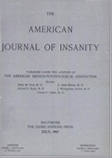BLOOD CHEMICAL CHANGES IN THE TOXIC PSYCHOSES
Abstract
1. Blood chemical examinations are of great value in the study of the early stages of mental disease especially those psychoses showing any symptoms of hallucinatory confusion. They assist in the differential diagnosis of the toxic psychoses especially of those on a uremic basis. They also aid in demonstrating the role of toxic factors in precipitating psychotic attacks in the major psychoses.
2. Evidence is presented to show that manic-depressive, schizoid and confusional reactions may in their early stages be accompanied by signs of toxemia, viz., leukocytosis, acidosis, fever and nitrogen retention.
3. Treatment directed toward the elimination of the toxemia is frequently effective in bringing about a mental recovery.
4. The toxins, acid or otherwise, so affect the hydrated colloids of the nerve cells as to bring about a cracking of the emulsion of which the nerve cell is composed. Treatment to be effective must take place before this irreversible cracking point is reached.
Access content
To read the fulltext, please use one of the options below to sign in or purchase access.- Personal login
- Institutional Login
- Sign in via OpenAthens
- Register for access
-
Please login/register if you wish to pair your device and check access availability.
Not a subscriber?
PsychiatryOnline subscription options offer access to the DSM-5 library, books, journals, CME, and patient resources. This all-in-one virtual library provides psychiatrists and mental health professionals with key resources for diagnosis, treatment, research, and professional development.
Need more help? PsychiatryOnline Customer Service may be reached by emailing [email protected] or by calling 800-368-5777 (in the U.S.) or 703-907-7322 (outside the U.S.).



